People & Lifestyle
The Cultural Tapestry of Tattoo Parlors
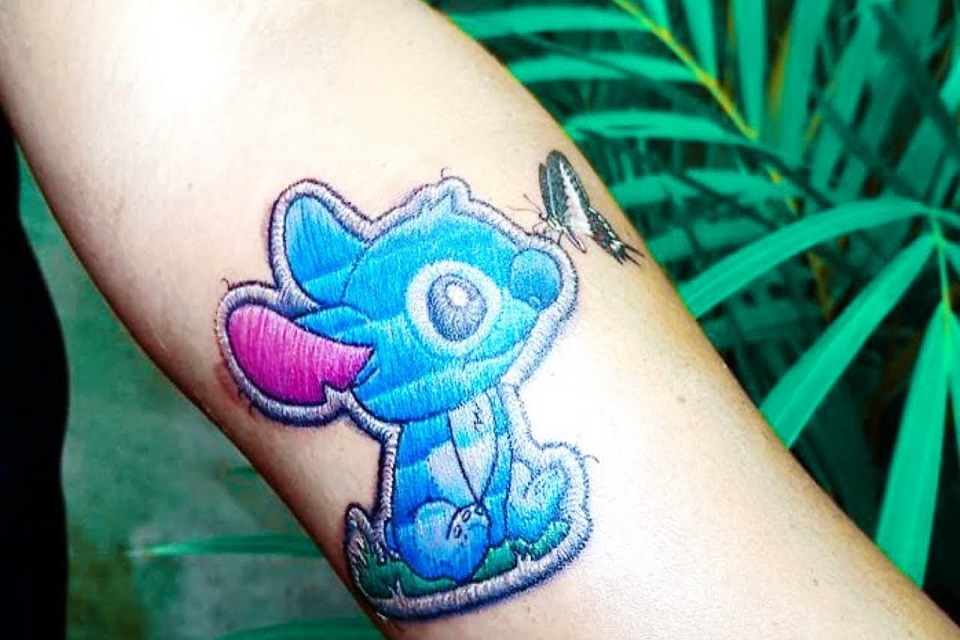
Tattoo parlors serve as vibrant hubs of art and expression, illustrating a rich history that spans various cultures and epochs. These establishments are not merely places where one receives ink on the skin; they are sanctuaries of personal and communal identity, canvases of visible narratives, and crossroads of artistic endeavors. We will delve into the historical background, cultural significance, artistic diversity, regulatory environment, and evolving trends of tattoo parlors, painting a comprehensive picture of their role in contemporary society.
Historical Origins and Global Traditions
The art of tattooing is as ancient as it is universal, emerging independently across various cultures worldwide. In ancient times, tattoos were symbols of status, spiritual protection, and even punishment. In Polynesia, intricate patterns conveyed social rank and tribal affiliations, while in ancient Rome, tattoos were sometimes used to mark criminals and slaves. However, The modern tattoo parlor began to take shape in the 19th century, particularly in port cities where sailors acquired tattoos as souvenirs of their voyages, spreading the art form across continents. Over time, these spaces evolved from back-alley operations into professional studios, mirroring the changing societal attitudes towards tattooing. Today, these parlors are recognized as legitimate businesses contributing to the local economy and the global culture of artistry.
Artistic Innovation and Styles
Tattoo places in Austin are the epicenters of artistic innovation where diverse styles and techniques coalesce. Traditional styles such as Japanese Irezumi and American Traditional have joined newer forms like geometric, watercolor, and photorealistic tattoos. Each style represents a unique aesthetic and technical approach, influenced by different historical backgrounds and cultural narratives. Tattoo artists in these parlors continuously push the boundaries of what can be achieved on human skin, experimenting with colors, shading, and dimensions to create stunning visual effects. This creative proliferation enhances the appeal of getting tattooed and elevates tattooing to a respected art form that attracts a diverse clientele ranging from art lovers to celebrities.
Cultural Impact and Social Acceptance
The role of tattoo parlors in cultural and social spheres has expanded significantly in recent decades. Once marginalized, tattooing is now embraced by mainstream culture as a form of personal expression and artistic freedom. This shift is largely facilitated by tattoo parlors that act as bridges between the underground tattoo community and the general public. These establishments foster a positive image of tattooing by hosting art shows, participating in charity events, and engaging in community services. Furthermore, the visibility of tattooed individuals in media and entertainment has played a crucial role in altering public perceptions, making tattoos a common sight in many professions and communities. This acceptance has spurred a growth in demand for tattoos, prompting an increase in the number and variety of tattoo parlors worldwide.
Regulatory Standards and Safety Practices
As tattoo parlors have increased, so has the focus on regulatory standards and safety practices within the industry. Ensuring the health and safety of both artists and clients is paramount. Professional parlors adhere to strict hygiene protocols, including sterilized equipment, single-use needles, and high-quality inks. Many regions have implemented licensing requirements for tattoo artists and regular inspections of tattoo parlors to comply with health regulations. These measures protect individuals from potential health risks and enhance the credibility of tattoo parlors as professional establishments. As the industry grows, these regulations are expected to become even more stringent, promoting a safer and more responsible tattooing environment.
The Future of Tattoo Parlors
Looking forward, the future of tattoo parlors appears vibrant and dynamic. Technological advances, such as digital tattoo machines and improved ink formulations, promise to enhance tattoos’ precision and durability further. Additionally, the growing trend of removable tattoos and the use of tattoos in medical fields, such as to cover scars or as medical alerts, point to new directions for applying tattoo art. As societal norms continue to evolve, tattoo parlors will likely play an even larger role in mainstream culture, breaking new ground in artistic expression and personal identity.
Tattoo parlors are more than just places where art meets skin. They are vital cultural institutions that preserve ancient traditions while fostering modern innovations. As they continue to navigate the challenges and opportunities presented by changing social norms and technological advancements, tattoo parlors remain at the forefront of the cultural dialogue about identity, art, and community. Through their ongoing evolution, these establishments reflect the changing contours of societal values and shape them, making an indelible mark both literally and metaphorically on the canvas of human culture. Safety standards in tattoo shops are paramount, given the nature of the practice, which involves needles and ink penetrating the skin.
People & Lifestyle
Transforming Maternal Health: Telecel Ghana Foundation’s Commitment to Healthier Pregnancies in the Ashanti Region
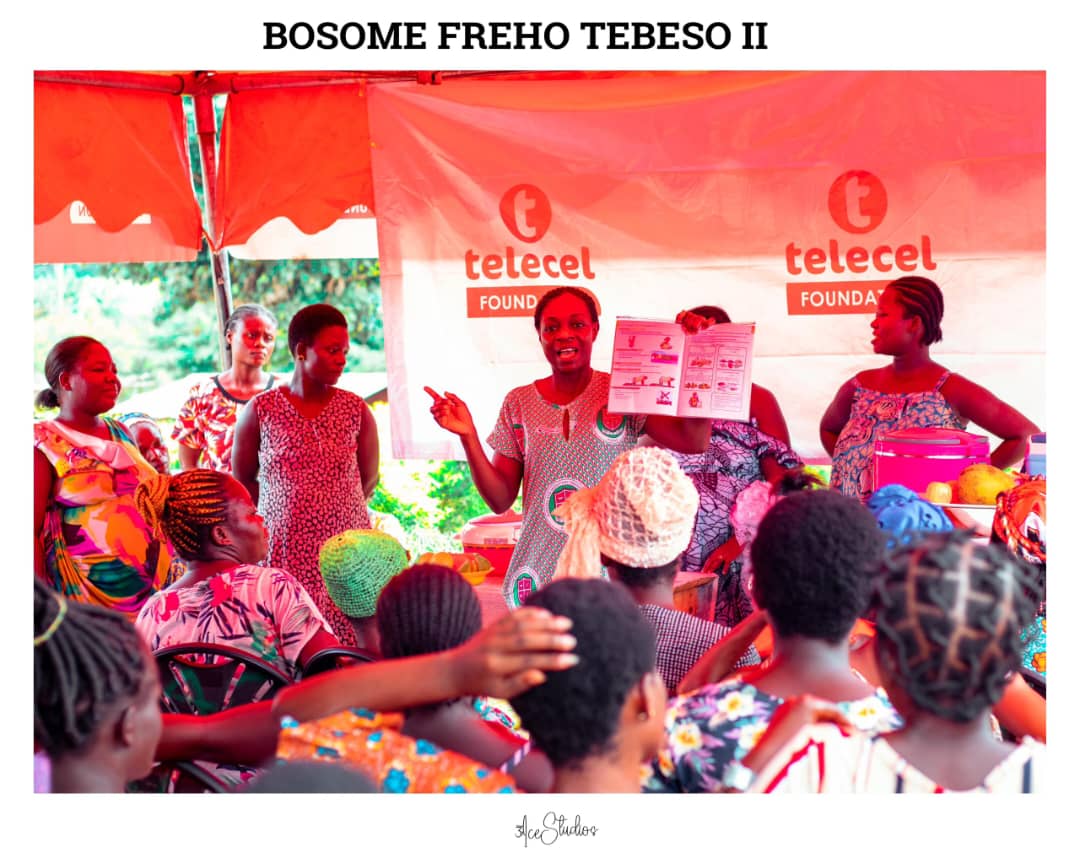
The Telecel Ghana Foundation’s Rural Ultrasound train made a stop at the Bosome Freho district of the Ashanti Region. The initiative, which is a part of the Foundation’s Connected Health programmes, reached 117 women in Tesebo No. 2 and 82 women in Nsuta, all within the Bosome Freho District in the Ashanti Region.
By detecting potential complications early, Telecel Ghana Foundation is helping reduce maternal and infant mortality rates, giving these mothers a fighting chance for healthy pregnancies and deliveries. This ongoing initiative has become a cornerstone of the Foundation’s community and health outreach efforts.
“We believe that no mother should lose life while giving life. That is why access to prenatal care is essential for both mother and child’s health,” said Rita Agyeiwaa Rockson, Head of Foundation, Sustainability, and External Communications at Telecel Ghana. “The goal of the Rural Ultrasound initiative is to bridge the healthcare gap in rural areas, ensuring expectant mothers receive the needed prenatal attention and some essential items during pregnancy, regardless of their location or financial standing.”
Beyond providing ultrasound scans, the initiative emphasizes educating women about pregnancy health, fostering awareness, and promoting proactive healthcare management. By identifying potential complications early, the Telecel Ghana Foundation aims to reduce maternal and infant mortality rates and support healthier pregnancies and births.
The recent activation in Tesebo No. 2 and Nsuta highlights the Foundation’s ongoing commitment to maternal health. These free ultrasound scans, a part of the Foundation’s Connected Health program, are a game-changer for mothers in underserved communities, as they help to bridge the healthcare access gap and alleviate the financial burden on these women.
Telecel Ghana Foundation is committed to supporting maternal health across Ghana and contributing its quota to the SDG Goal 3, Target 3.1, which is to reduce the global maternal mortality ratio to less than 70 per 100,000 live births by 2030.,” added Rita Agyeiwaa Rockson. “Through our efforts, we hope to make a tangible difference in the lives of many women and their families.”
Telecel Ghana Foundation’s Rural Ultrasound Initiative is a shining example of their dedication to improving lives. As the foundation prioritizes healthcare interventions, it anticipates further positive outcomes benefiting more women and families in the future.
People & Lifestyle
OmniBSIC Bank steps up for health, unity with a 10km community walk
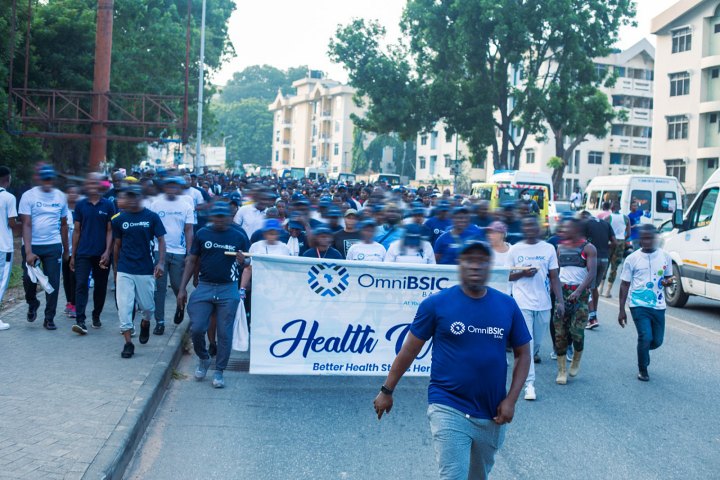
As part of its second-quarter health initiative for 2024, OmniBSIC Bank, the fastest growing bank in Ghana, has organised and successfully executed a 10-kilometer health walk which took place on Saturday, June 29, 2024,. The event brought together enthusiastic staff, loyal customers and members of the public to champion healthy living and community spirit.
CEO of OmniBSIC Bank Ghana, Mr. Daniel Asiedu, underscored the Bank’s unwavering commitment to employee well-being and community health. “In today’s world, health issues are increasingly prevalent. As an institution deeply rooted in our community, we prioritize events that promote healthy living and inspire others to do the same. We encourage all organizations to join us in fostering a healthier Ghana through similar initiatives,” he said.
The morning commenced with a vibrant warm-up and aerobics session at the Forecourt of the State House starting promptly at 5:30 am. Led by seasoned fitness instructors, participants engaged in dynamic stretches and aerobic exercises designed to prepare them both physically and mentally for the walk ahead.
At 6:00 am, amid an atmosphere of anticipation and camaraderie, the health walk officially began. Participants embarked on a carefully planned 10-kilometer route that traversed central Accra’s bustling streets, offering scenic views of the city’s iconic landmarks and vibrant neighborhoods.
The route not only promoted physical activity but also provided a unique opportunity for participants to appreciate the cultural and architectural richness of their city. The event attracted a diverse group of participants, including enthusiastic bank employees, their families, supportive friends, and members of the general public.
This impressive turnout, Mr. Asiedu said, exemplified OmniBSIC Bank’s dedication to community engagement and social responsibility, fostering an atmosphere of unity and shared purpose among all attendees. Throughout the walk, participants took advantage of the occasion to network, share experiences, and forge new connections.
To ensure the safety and well-being of all participants, OmniBSIC Bank Ghana meticulously coordinated the event, with hydration stations strategically positioned along the route. These stations provided participants with necessary refreshments, ensuring they remained hydrated and energized throughout the entirety of the walk.
“This event showcased the power of community and underscored the importance of physical activity in achieving a balanced and healthy life,” Mr. Asiedu added, reflecting on the walk’s resounding success.
He further stated that OmniBSIC Bank remains committed to leading by example in promoting health-conscious initiatives and strengthening community bonds through events like the 10-kilometer health walk. The Bank looks forward to continuing its efforts to inspire and empower individuals to prioritize their health and well-being for a better tomorrow.
The health walk ended at the Forecourt of the State House where over 50 customers of the Bank ranging from FMCGs, travel and tour companies, health and wellness, automobile companies, and several others exhibited their products and services.
About OmniBSIC Bank
OmniBSIC Bank is a fully-fledged universal bank that traces its roots to a merger between the erstwhile OmniBank and Sahel Sahara Bank. The merger was spurned by the banking sector consolidation program introduced by the Bank of Ghana (BOG) in 2017, through several directives including the increment of the minimum capital requirement almost fourfold.
The union between the banks is one of the most successful mergers in the financial services industry.
With headquarters at Atlantic Tower, Airport City, and an extensive Branch network of 40 across Ghana, OmniBSIC Bank provides a complete range of products, services, and digital offerings tailored to the needs of its Corporate, SME, and individual customers while supporting the communities in which the Bank operates.
The Bank is a member of the Ghana Deposit Protection Scheme. For more information, please visit: www.omnibsic.com.gh
People & Lifestyle
STATEMENT: Allegations by ATC Ghana Against Telecel Ghana
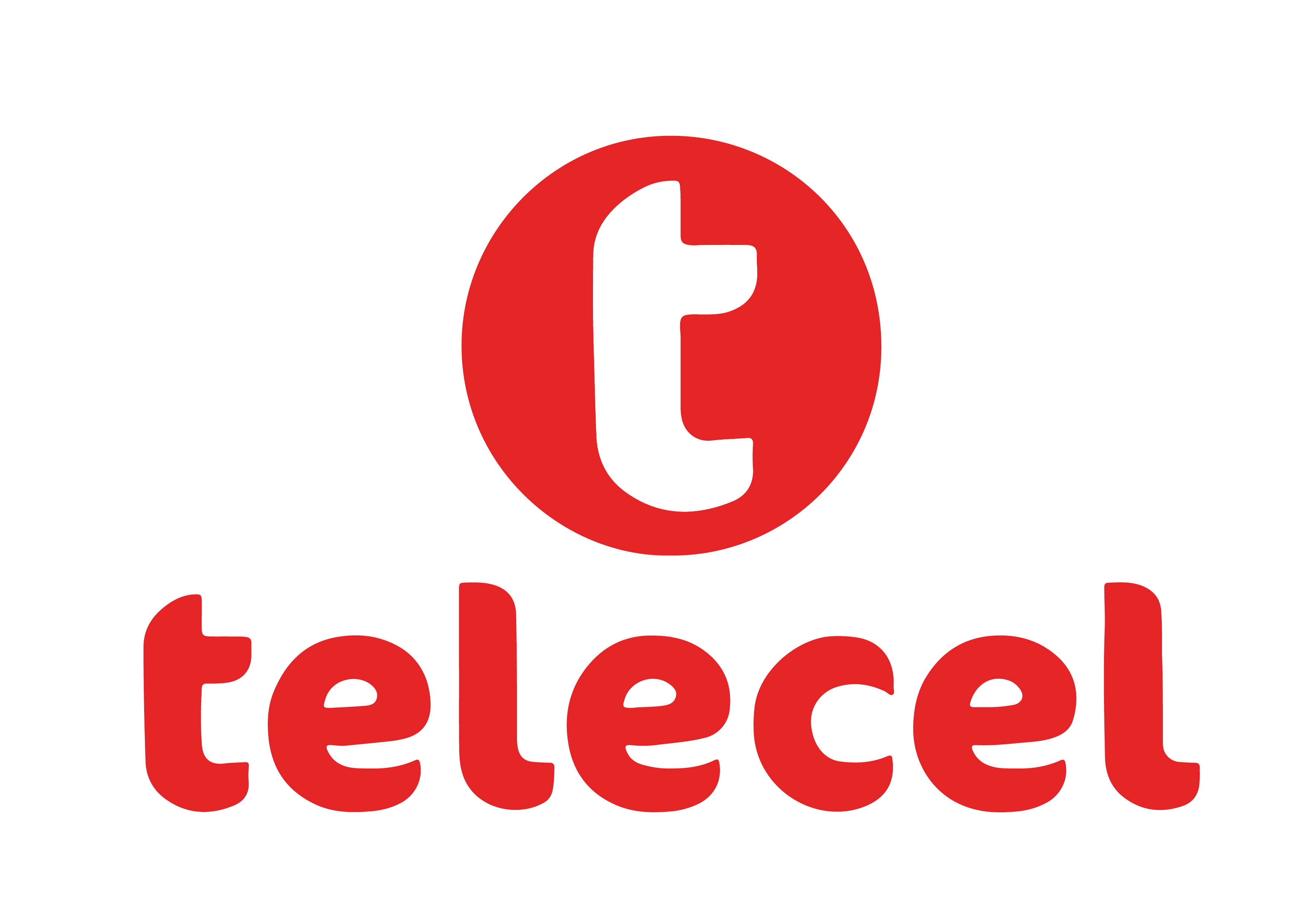
The attention of Telecel Ghana has been drawn to a publication by ATC Ghana alleging Telecel Ghana’s failure to satisfy its agreed obligations.
Telecel Ghana categorically states that these allegations are utterly false.
The issue has been escalated to the regulator, National Communications Authority (NCA) and is receiving the required attention.
Telecel Ghana remains committed to its contractual obligations and assures its subscribers that it will take all measures to ensure service continuity.
Telecel Ghana reserves the right to use all lawful means to protect its brand and claim damages it will suffer as a result of the publication and any unlawful actions taken by ATC Ghana.
People & Lifestyle
MTN EXECUTIVES ADVOCATE FOR PARTNERSHIPS TO CREATE A ROBUST SME ECOSYSTEM

Executives of MTN Ghana have reiterated the company’s commitment to supporting the growth of local SMEs in Ghana at the recent MTN Ghana Business Executive Breakfast held under the theme “Bridging the Credit Risk Gap for SMEs in Ghana.”
In his keynote address, Mr. Stephen Blewett, Chief Executive Officer of MTN Ghana, emphasized the importance of supporting SMEs in accessing funds through strategic partnerships. He stated that fostering partnerships with banks, microfinance institutions, and FinTech companies is essential to creating a robust ecosystem for SME financing. Collaborative efforts can lead to the development of innovative financial products and services specifically designed to meet the needs of SMEs.
Shaibu Haruna, Chief Executive Officer of MobileMoney Ltd shared the company’s plans to develop digital solutions to support SME transactions and enhance financial inclusion through digital payment channels. He mentioned MobileMoney transactions as one of the digital footprints that could help profile customers and enable tailor-made solutions to address specific customer needs regarding access to credit. He cited access to Qwikloan as one source of credit that has been enabled by technology, thereby eliminating bureaucracy and credit risk issues, while admitting that there may be some defaulters.
“We have learned our lessons from Microcredit, and we are ready to provide a basic foundation for financial players to support the ecosystem. We need to evaluate how we use digital footprints to address issues around risk and progressively provide lending for SMEs. By leveraging digital technology, we can create a more inclusive lending ecosystem that supports the growth of SMEs in Ghana,” said Mr. Shaibu Haruna.
Angela Mensah-Opoku, Chief Enterprise Business Officer of MTN, reiterated the company’s commitment to facilitating the development of small and medium enterprises through enhanced financial accessibility and technological empowerment. Highlighting the importance of technology in addressing the challenge of creditworthiness for businesses to drive growth, she emphasized that technology provides a platform that helps standardize business processes and avoid paper processing.
“Digital disruption also involves changing what we believe are the standards for financial inclusion; using technology is an authentic way to go,” she added. She stated, “MTN is open to collaboration across the SME value chains. We must work together to support informal SMEs seeking access to working capital for growth. Information asymmetry is a big challenge for them, and we need to be more inclusive. Digital insights and access to data will change the requirements for lending.”
The MTN Executive Breakfast Meeting brought together key stakeholders to explore solutions to bridge the credit risk gap for SMEs. The event highlighted the importance of SMEs to Ghana’s economy and the need for support.
People & Lifestyle
Hollard Life’s microinsurance funeral and disability policy, MeBanbo, is now available on MTN MOMO
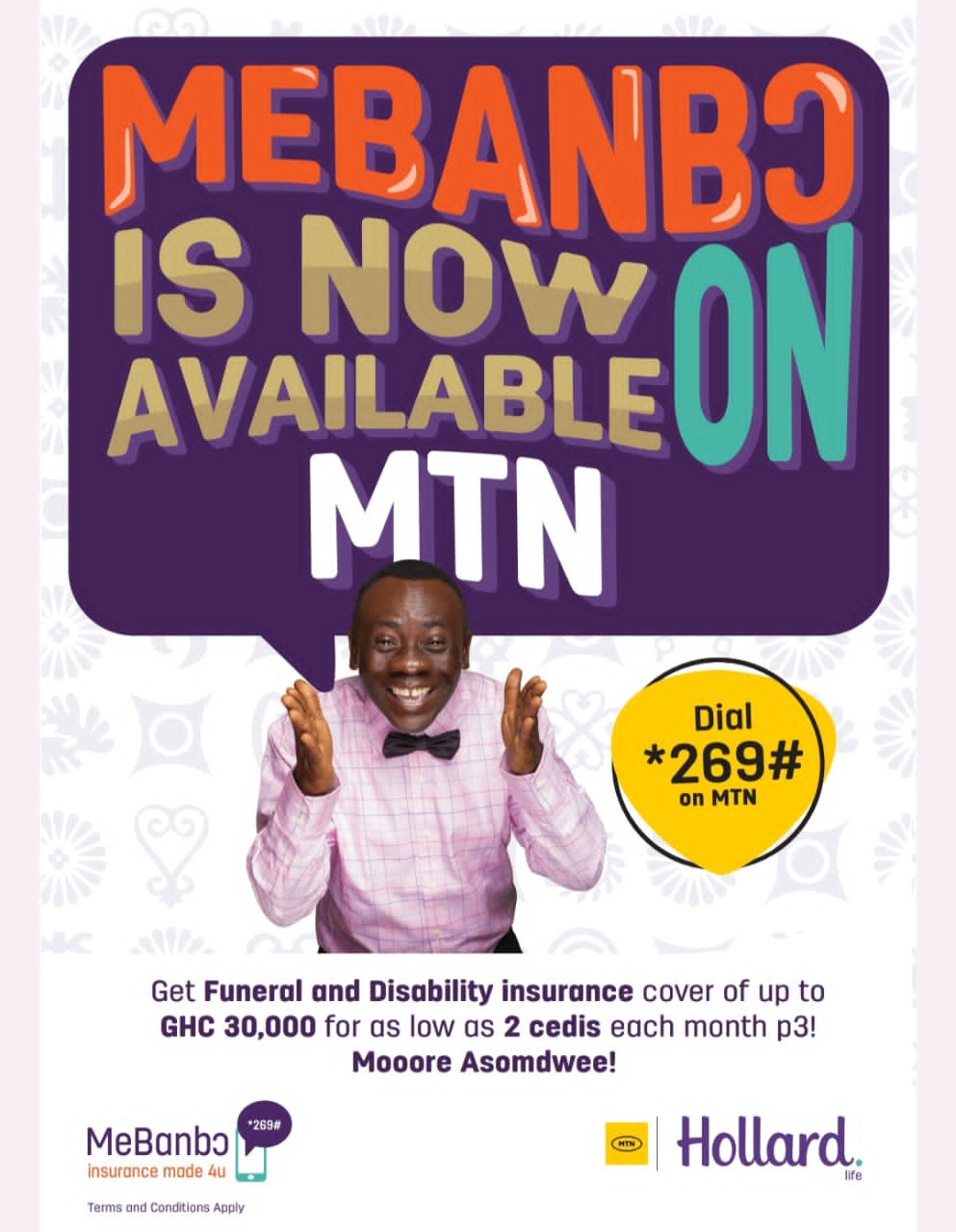
Hollard Life Assurance, a subsidiary of Hollard Ghana, is delighted to announce the expansion of its micro-insurance product, MeBanbɔ, with a pan-African fintech company, Sassai Fintech and Telecel, to include MTN.
MeBanbɔ, a funeral and disability insurance policy, can now be conveniently accessed via mobile phone by dialling USSD code *269# on MTN and Telecel. This strategic move is a testament to the insurer’s commitment to creating and securing better futures. This easy accessibility puts the power of financial security in the customer’s hands.
With the expansion, MeBanbɔ now offers enhanced benefits. According to the Managing Director of Hollard Life, Nashiru Iddrisu, these include improved customer service, faster claim processing, and more competitive pricing.
“We are excited to announce that MeBanbɔ is now accessible to all Ghanaians on both Telecel and MTN. This significant milestone directly responds to our customers’ requests for inclusivity. We are committed to serving the entire Ghanaian population with customised solutions, and this expansion is a step in that direction”.
“With a track record of providing reliable insurance services, we are dedicated to ensuring that our customers and their dependents, including spouses, children, parents, grandparents and in-laws, have the peace of mind that comes with being adequately covered. MTN users need their Ghana card number to complete the registrations for automatic monthly deductions from their mobile money wallet. In our quest to deepen financial inclusion, MeBanbɔ will soon be available on all networks,” he added.
MeBanbɔ provides tailored packages of GHS 1,000, GHS 5,000, GHS 15,000, and GHS 30,000 funeral and disability cover for premiums as low as GHS 2, GHS 10, GHS 25, and GHS 50, respectively. This micro-insurance product is designed to suit various personal needs and is available to individuals over 18 who use MTN or Telecel mobile networks.
About Hollard Life Assurance
Hollard Life is a subsidiary of the insurance group Hollard Ghana, which combines its deep local knowledge of the market with the world-class expertise of an international insurance brand. With feet firmly planted on Ghanaian soil but Headquarters in South Africa, Hollard delivers innovative insurance solutions customised to the unique risks Ghanaians face. Hollard was previously Metropolitan Insurance, which operated in Ghana for over 25 years.
Hollard Life Assurance offers various life insurance products, including funeral, personal accident, savings and investment, group life insurance, employee plans, and more. Beyond various nationwide office branches and agents, Ghanaians can find Hollard at Shell Fuel Station Welcome Shops and some Melcom stores across Ghana.
People & Lifestyle
AICCRA Ghana opens application for Accelerator Program for Agribusinesses
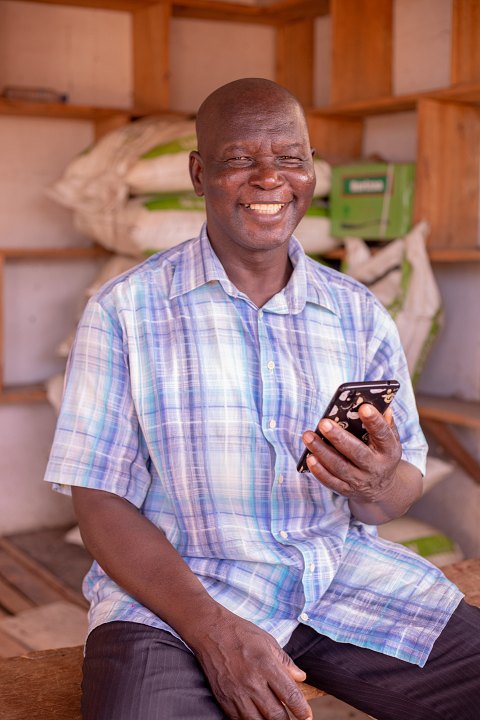
The Accelerating Impact of CGIAR Climate Research for Africa (AICCRA) project in Ghana has launched a call for applications for its new agribusiness Accelerator Program.
The program aims to leverage private sector networks to address development and business challenges related to scaling products and services that will improve farmers’ productivity and income.
The call for application which commences on June 3 will run till August 31, 2024.
Under the program, AICCRA and partners will work with individual businesses or consortia of businesses to provide end-to-end solutions for the following Climate Information Services (CIS) and Climate Smart Agriculture (CSA) bundles:
Solar Irrigation for female farmers, which aims to Improve resilience, yields and income through the deployment of solar irrigation solutions and supporting adaption through sustainable finance solutions and market access;
Smart Seed Packs and Market Systems for Smallholder Farmers bundle, which aims to improve access to stress and pest-tolerant seed varieties and associated agronomic practices to improve farmers’ resilience, yields, and income;
Smart Productions and Soils bundle, which promote sustainable production and soil health by providing access to agro-advisories, sustainable mechanization technologies and nutrient management practices.
Climate-Smart Integrated Pest Management bundle, which promotes sustainable management of invasive and climate-driven crop pests and diseases through the deployment of low-toxicity pesticides, biopesticides, biological control and good agroecological practices with plant health benefits;
Dr Faustina Obeng Adomaa, AICCRA’s Program Officer and Coordinator of the accelerator program, said it aims to boost private-sector participation in the Ghana’s climate-resilience efforts.
“Supporting farmers to mitigate climate risks is critical to ensuring a resilient food system. Through this program, we are aiming to leverage on the strategic role of SMEs in the agriculture sector to deliver solutions that build climate resilience of farmers while being responsive to gender and other social vulnerabilities across the country, “she said.
Businesses and social enterprises can apply to the program at: https://aiccra.cgiar.org/news/call-applications-ghana-accelerator-program
Info and matchmaking events will be held virtually on July 25 and in person on August 1 for applicants to interact with the program’s coordinators, learn more about the program, and explore potential partnerships with other applicants.
Accelerating Impacts of CGIAR Climate Research for Africa (AICCRA) helps deliver a climate-smart African future driven by science and innovation in agriculture. AICCRA works with national partners in Senegal, Ghana, Mali, Ethiopia, Kenya, and Zambia to make climate information services and climate-smart agriculture more accessible to millions of smallholder farmers across Africa. In Ghana, AICCRA is led by the International Institute of Tropical Agriculture (IITA) a member of CGIAR.
CGIAR is a global research partnership for a food-secure future dedicated to transforming food, land, and water systems in a climate crisis.
-

 Gossip2 days ago
Gossip2 days agoGhana’s Chef Smith is new world cook-a-thon record holder
-

 Buzz2 days ago
Buzz2 days agoSarkodie will not perform at Olympics opening – DJ Mensah provides clarity on Paris event
-

 Buzz2 days ago
Buzz2 days agoSarkodie to perform at 2024 Olympics opening ceremony – DJ Mensah reveals
-

 Buzz2 days ago
Buzz2 days agoRama Brew and daughter announce ‘Ultimate Paradise’ rerun
-

 Buzz1 day ago
Buzz1 day agoThe highest amount I’ve been paid is GH₵70,000 – Champion Rollie
-

 Buzz2 days ago
Buzz2 days agoKofi Kinaata and Stonebwoy’s Songs Are Full of Wisdom – Ohemaa Mercy
-

 Listen1 day ago
Listen1 day agoH.Hardy shares personal adulation to God on new single ‘Alive’
-

 Buzz2 days ago
Buzz2 days agoLilWin ‘disappointed’ by public perception following accident resulting in 3-year-old boy’s death
-

 Buzz2 days ago
Buzz2 days agoMy issue with Team Eternity over ‘Defe Defe’ amicably solved – Kwame Mickey
-

 Buzz2 days ago
Buzz2 days agoBlack Sherif Credits ‘Top Seamstress Mum’ for His Unique Fashion Sense
-

 People & Lifestyle1 day ago
People & Lifestyle1 day agoGerman State Parliament honours Former KNUST Publishing Studies
-

 People & Lifestyle2 days ago
People & Lifestyle2 days agoMohammed Kudus, Dr. Prince Kofi Pambo inspires students at St. Nicholas Charity School in Tema





















